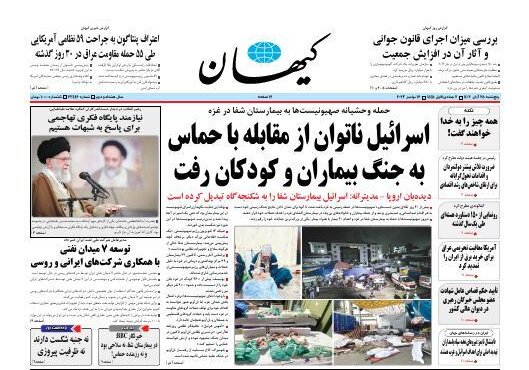Revealing Trump's false claim about Iran

In a note, Kayhan analyzed how the Washington Post revealed Trump's false claim about Iran when the Islamic Republic showered a U.S. air base in western Iraq with missiles in January 2020.
It said: Trump claims that Iran informed him that it will attack an American base and shoot missiles “around” the (Ain Al Asad) base. This claim by Trump is nonsense. In fact, Iran gave a vague warning to then Iraqi Prime Minister without introducing the target of the attack, and most of the missiles hit the base. No one was killed though more than 100 service members suffered from traumatic brain injuries. In his interview with Univision, Trump claimed, “They (Iranians) call me and … this is Iran. This is, you know, this is Iran who’s supposed to be so hostile. They respected us. And I respect them.” The Post also mentioned the meeting of then-Japanese Prime Minister Shinzo Abe with the Leader of Iran in Tehran in the same year that Iran hit the Ain Al Asad air base. The Keyhan newspaper added when Abe carried a message from Trump to Ayatollah Khamenei, the Leader told Abe that "I have no response for him and will not answer him" and that Trump was not “worthy” of exchanging messages with. In such an environment how could it be possible for Iranian officials to contact Trump and coordinate the attack on the Ain Al Asad air base with him?!
Shargh: Increasing Iran's credibility
Shargh devoted its headline to Iran's position and strategy in the Gaza war. It wrote: Although Iran has repeated the calls of the United Nations and others for a quick end to the Israel-Hamas war, it seems that a long battle can ultimately benefit Iran. Now Hamas has managed to bring the proxy war that was usually going on in Lebanon and Syria into Israel. According to Tehran, this war can help Hamas to permanently stop Israel from attacking the Palestinians in the Gaza Strip and teach Israel that attacking this territory will be very costly. This war can turn the regional resistance groups into highly coordinated guerilla rebel groups. It can give the Islamic Republic of Iran a new moral claim among non-Western countries and greatly increase Tehran's prestige in the Arab world. Also, if this war turns into a wide regional conflict, it can create a window of opportunity for Iran, including in the nuclear issue.
Arman-e-Melli: America's demand to China about Iran
Arman-e-Melli wrote in an article: After the four-hour meeting and conversation between Joe Biden and Chinese President Xi Jinping, a senior American official said that Biden asked China to use its influence with Iran and ask Tehran to stop what it called "provocative actions". This demand has been raised by Biden while the United States has fully supported the Zionist regime since the beginning of the Gaza war. To create "deterrence" against Iran and the resistance groups in the region, the Pentagon has increased the number of its military personnel, shipped a large cache of weapons to Israel, and sent two strike carriers to the Eastern Mediterranean and such moves have intensified the situation in the region. Iran has rejected the issue of "ordering or controlling" the resistance forces in the region for their retaliatory attacks on American bases in the region. About Hamas’ October 7 attack in south Israel, Iran has said that they make their own decisions. However, Iran has warned against the expansion of conflicts in the Gaza war and its transformation into a regional war.
Ham Mihan: Return to the negotiating table?!
In a commentary, Ham Mihan discussed the need for negotiations between Iran and the United States following the Gaza war. The paper said: According to the Responsible Statecraft think tank, in order to prevent the terrible scenario of the spread of regional war, Washington should establish a direct channel to Tehran in addition to existing contacts in the region and seek serious dialogue about the future not only Gaza and Palestine but the entire Middle East. Also, the United States should encourage this regional reconnection and establish a direct dialogue with Iran. The alternative of dividing the region into moderates (such as Saudi Arabia, the UAE, Egypt, and Jordan) and hardliners (Iran, its allies, and proxies) has been tried and failed miserably. The consequences of this failure are tragically displayed in Gaza. Establishing direct talks with Iran will not solve all the problems of the region. It may also bring domestic political risks for Biden in the year leading up to the election but doubling on the strategy of excluding Iran from any solution in Gaza and the future security configuration in the Middle East will surely perpetuate cycles of violence in the region.
Leave a Comment